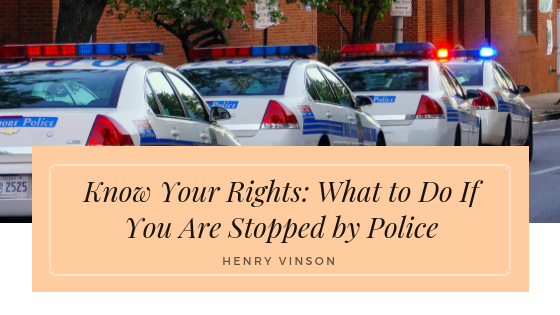Getting pulled over or being stopped by an officer in the street can be a stressful situation. It’s important that you understand your rights as well as the typical protocol to avoid unnecessary conflict, agitation, and undeserved treatment. While police are present to protect you, you should be aware of your legal rights in case you are wrongfully accosted or find yourself in danger.
Silence
One of your most important rights is that of silence. You can choose not to speak to an officer of the law and instead invoke your fifth amendment right and insist on attaining an attorney prior to any conversation. Depending on the context of your situation and the state in which you live, it is often wise to provide your name and address when asked. Beyond this information, you have the option to stay quiet.
Asking to Leave
If you feel you have done nothing deserving of this incident or that the police have no reason to hold you, ask them if you are free to leave. If they answer affirmatively, you have every right to leave the premises. Likewise, you always have the option to ask questions for clarification. An officer pulling you over and insisting you get out of the car may warrant you asking if he is ordering you to consent to a search. Being bold in this way can help prevent any violation of your implicit rights.
Decline a Search
A police officer may want to search your person, vehicle, or property, but you usually have the right to deny their efforts; saying “I do not consent to a search” will generally prevent them from proceeding. If they have a warrant or they suspect you have a weapon, your consent may not matter, but you do not have to oblige their search if you don’t want to.
Record
Recording police activity may be frowned upon by some officers, but it is certainly legal. Making the effort to document your interaction can help provide you with factual evidence regarding any mistreatment or violations, and having that data can serve as a safety net. It’s important to remember that retrieving a device for the purpose of recording could convey a threat, so you’ll want to be cautious.
In addition to knowing your rights and being able to invoke them after being stopped, you should also be aware of the typical protocol that a police interaction demands. Never flee or make sudden movements that could be perceived as an attempt to evade or harm an officer. You should keep your hands visible, free of objects when possible, and away from the officer. Lastly, you should make every effort to follow instructions; if you feel your rights have been violated during this encounter, you can file a report afterward.
Ensuring your safety and the sanctity of the law are top priorities during a police interaction. You should be careful and make sure you are educated on your rights to avoid forfeiting information or endangering yourself or others.
